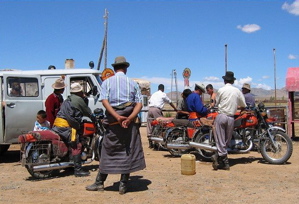
At the Doulong Store, the musty shelves are stocked with the necessities for Tibetan nomads. There are kettles for yak butter tea and bolts of colorful fabric for traditional robes and clothing. A nomad affluent enough to use a light bulb in his tent can buy an electric generator.
But an unexpected necessity here in the immense grasslands of the Tibetan plateau are the six motorcycles on display, including the Asiahero Alt 150-7 bought by a nomad named Trashi Dorjay. He had traveled almost 320 kilometers, or 200 miles, to the store from his tent because he wanted a bike to herd his sheep and yaks.
“I used to ride a horse,” he explained. “A motorcycle is faster.”
“You’re only a real nomad if you ride a horse,” said one man, Tsendo, as he sat in a hillside tent a two-hour drive from the nearest town. Then, glancing at a motorcycle parked inside the tent, he laughed and added, “But this is our horse.”
Many nomads credit China’s economic changes for the arrival of the motorcycle. Under the old system, nomads raised their yaks and sheep in a collective and were required to sell certain numbers of animals at a set price to government agencies.
But by the late 1980s, nomads could sell their yaks and sheep at a higher market price. This remains one of China’s poorest areas, but over the years some nomads were able to save enough money to buy motorcycles.
More recently, the arrival of cheaper, Chinese-made models costing about $600 has made motorcycles more affordable. A used model can be bought for $50, and nearly every crossroads in the region seems to have a motorcycle repair or sales shop.
Been saving this for a weekend. Nice, detailed article about the passing of a way of life that was romantic — at least to outsiders who didn’t have to put up with it.
The best of any lifestyle can pass through qualitative economic changes, adapt and thrive. Winess the Buddhist priest with a jeep in the article. Proto-Luddites get their shorts all wrinkled when people use machines instead of animals; but, strangely enough, I always find they never had to spend much of their youth plowing behind a mule — or for that matter, operating a punchpress in a factory.















I love the concept of societal evolution through the synthesis of tradition and technology. Progess is not always good, but neither is it always bad.
Just amazing.
Funny to think that they would trade a hourse, that doesn’t reuire buying gasloine to run, over a horse which can grase along the trail – then I remember how long ago the US went through this transformation, and why.
Interesting that they are bringing-in solar panels.
The idealist in me would like to see them leap-frog past gasloine-powered motorcyles – the way developing areas are leap-frogging wired phone systems for wireless.
I was just at a local store [Gresham, Oregon] that had a few of the electric mopeds for sale.
It would be wonderful if the nomads had electric cyles, and portable panels to re-charge them…
Communal/collective-owned charging stations…
Damn. Bad hair days are bad enough, but bad spelling days are even more embarassing…
I remember reading that in Thailand, before most of the people could afford cars, they started replacing their water buffaloes, horses, etc. with “iron horses” – basically an overgrown lawn mower that was hitched to a wagon in place of the water buffalo.
This makes me sad….but happy as well…..it’s good that people can improve their lot with the help of some of mans inventions. But it’s sad to see a way of life slowly going away. As you said though Eideard….the nostalgia is usually felt by those who never had to lead the old life.